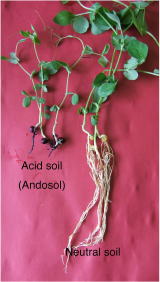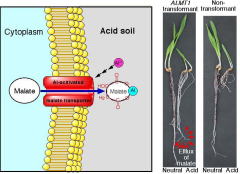植物成長制御グループでは環境ストレス下での植物の成長制御機構を研究してます。
Our Research (Group of Plant Growth Regulation)RECRUIT
This group is a new one, started from April 2008.
Now, 8 members are studying in this laboratory (April, 2014).
We are interested in the regulation mechanism of plant growth under environmental stresses, which will be studied at cellular, tissue, organ and whole plant levels.
We are now focusing on on aluminum (Al) ion, a major inhibitory factor of plant growth in acidic soils, and analysis of the mechanisms of Al toxicity and tolerance, using a cultured cell system and whole plants. Since Al-enhanced production of reactive oxygen species (ROS) is related to cell death, the production mechanism of ROS as well as the mechanism of protection from ROS have been examined, focusing on energy metabolism.
For Al-tolerance mechanism, we isolated wheat ALMT1 gene encoding Al-activated malate transporter and found to be Al-tolerant as well as acidic-soil tolerant gene, for the first time in crops. The molecular details of the structure and functions and the expression mechanism of this transporter are now studied.
In addition, since the ALMT gene and its homologues have been found only in plants, we are trying to elucidate the functions of individual ALMT genes.

Root growth inhibition in acidic soils is caused by Al ion.
Compared to neutral soil, plant growth in acidic soils is inhibited, which is mainly due to Al ion. In this picture, germinated pea seeds were grown in either acidic soil (Andisol was used) or neutral soil (control) for 10 days. Compared to the control, growth in the acidic soil is less in both root and shoot. Hematoxylin staining indicates the accumulation of Al ion on the root part grown in acidic soils, but not in neutral soil.

Al ion enhances reactive oxygen species (ROS) production in roots.
The accumulation of Al ion on root surface immediately enhances ROS production. In this picture, root part of pea seedling is treated hydroponically without (control, right root each time) or with Al (left root) for up to 12 h. At times indicated, root parts were stained with fluorescent reagent to detect ROS (shown with orange color).

Function of ALMT1 and growth of ALMT1-transgenic barley on acid soil.
The ALMT1 gene encodes an Al activated malate transporter that confers Al tolerance to the plant. The transgenic barley showed a high level Al tolerance on acid soil.
Now, 8 members are studying in this laboratory (April, 2014).
We are interested in the regulation mechanism of plant growth under environmental stresses, which will be studied at cellular, tissue, organ and whole plant levels.
We are now focusing on on aluminum (Al) ion, a major inhibitory factor of plant growth in acidic soils, and analysis of the mechanisms of Al toxicity and tolerance, using a cultured cell system and whole plants. Since Al-enhanced production of reactive oxygen species (ROS) is related to cell death, the production mechanism of ROS as well as the mechanism of protection from ROS have been examined, focusing on energy metabolism.
For Al-tolerance mechanism, we isolated wheat ALMT1 gene encoding Al-activated malate transporter and found to be Al-tolerant as well as acidic-soil tolerant gene, for the first time in crops. The molecular details of the structure and functions and the expression mechanism of this transporter are now studied.
In addition, since the ALMT gene and its homologues have been found only in plants, we are trying to elucidate the functions of individual ALMT genes.

Root growth inhibition in acidic soils is caused by Al ion.
Compared to neutral soil, plant growth in acidic soils is inhibited, which is mainly due to Al ion. In this picture, germinated pea seeds were grown in either acidic soil (Andisol was used) or neutral soil (control) for 10 days. Compared to the control, growth in the acidic soil is less in both root and shoot. Hematoxylin staining indicates the accumulation of Al ion on the root part grown in acidic soils, but not in neutral soil.

Al ion enhances reactive oxygen species (ROS) production in roots.
The accumulation of Al ion on root surface immediately enhances ROS production. In this picture, root part of pea seedling is treated hydroponically without (control, right root each time) or with Al (left root) for up to 12 h. At times indicated, root parts were stained with fluorescent reagent to detect ROS (shown with orange color).

Function of ALMT1 and growth of ALMT1-transgenic barley on acid soil.
The ALMT1 gene encodes an Al activated malate transporter that confers Al tolerance to the plant. The transgenic barley showed a high level Al tolerance on acid soil.
- Contact us
- Prof. Yoko Yamamoto
Institute of Plant Science and Resources, Okayama University, Chuo 2-20-1, Kurashiki, Okayama 710-0046, Japan
E-mail. yoko(AT)rib.okayama-u.ac.jp - Please change (AT) to @
バナースペース
植物成長制御グループ
〒710-0046
倉敷市中央2−20−1
TEL 086-434-1233
FAX 086-434-1236